Report on Entrepreneurial Ventures, Economic Impact, and Strategy
VerifiedAdded on 2023/01/18
|17
|5452
|53
Report
AI Summary
This report provides an in-depth analysis of entrepreneurship, focusing on various venture types such as small businesses, scalable startups, social enterprises, and large company entrepreneurship. It explores the similarities and differences between these ventures, examining their impact on the economy, particularly in the context of the UK. The report discusses the growth and development of entrepreneurial ventures, highlighting the importance of micro and small businesses and their contribution to job creation and economic development. The report also delves into the topology of entrepreneurship, including skeptical, manager, research, and copycat entrepreneurs. The report further provides an overview of entrepreneurial attributes and abilities, using the OCEAN model for personality examination, and concludes with a discussion of factors that enhance entrepreneurial performance. The report also presents data and strategies to illustrate the impact of micro and small businesses on the economy. The report covers the diverse range of entrepreneurial ventures in both public and corporate sectors.

Entrepreneurship and
Small Business
Management
Small Business
Management
Paraphrase This Document
Need a fresh take? Get an instant paraphrase of this document with our AI Paraphraser
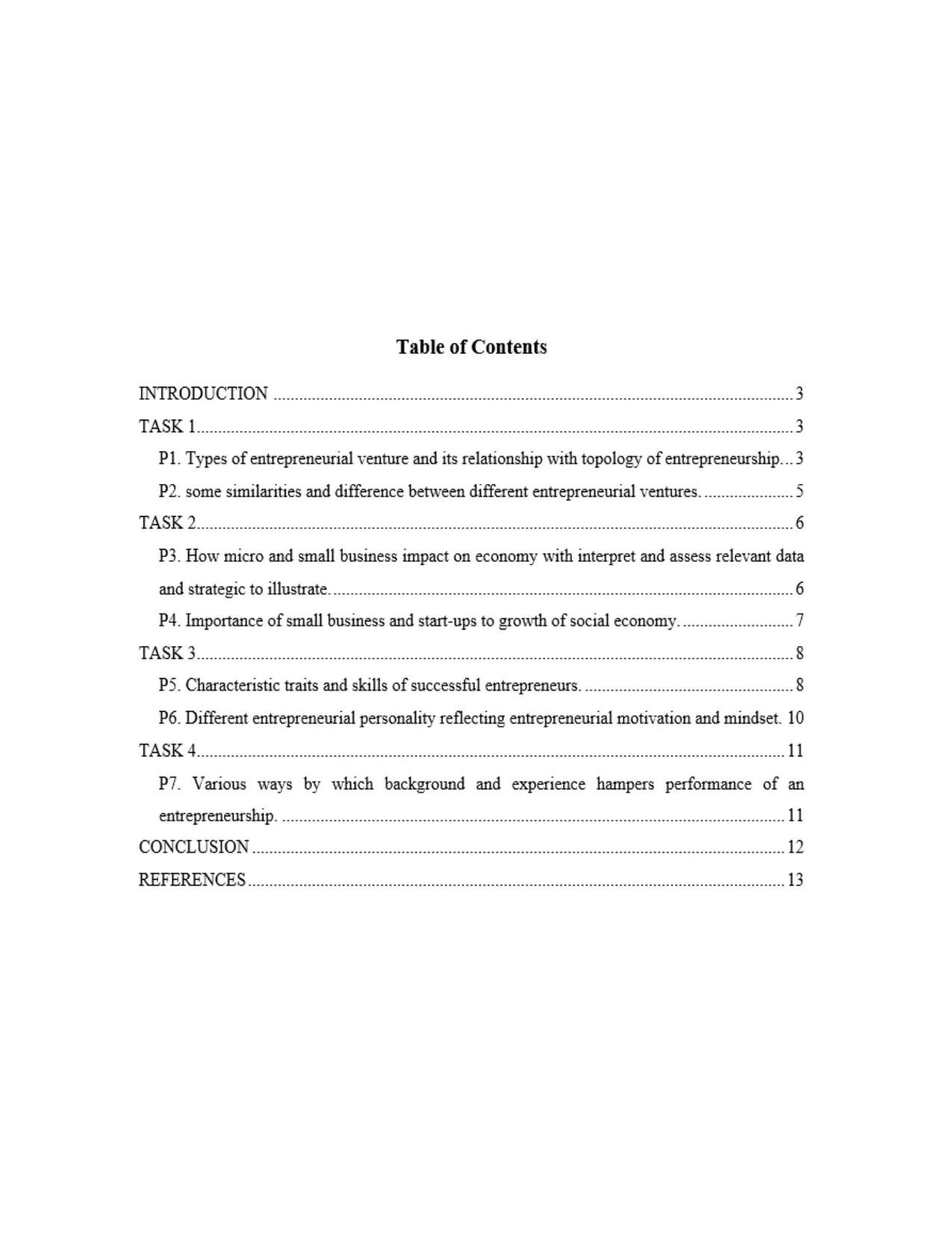
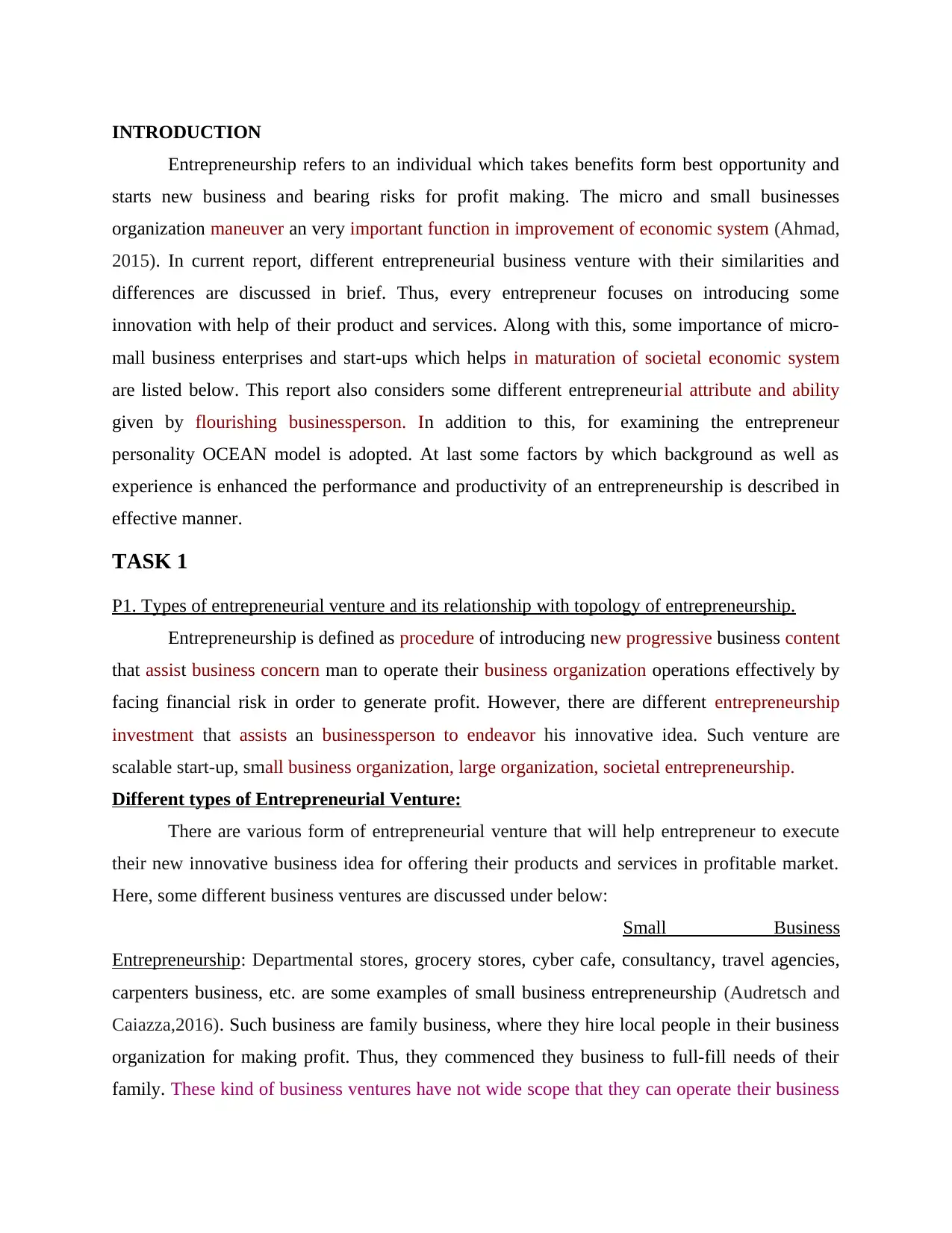
INTRODUCTION
Entrepreneurship refers to an individual which takes benefits form best opportunity and
starts new business and bearing risks for profit making. The micro and small businesses
organization maneuver an very important function in improvement of economic system (Ahmad,
2015). In current report, different entrepreneurial business venture with their similarities and
differences are discussed in brief. Thus, every entrepreneur focuses on introducing some
innovation with help of their product and services. Along with this, some importance of micro-
mall business enterprises and start-ups which helps in maturation of societal economic system
are listed below. This report also considers some different entrepreneurial attribute and ability
given by flourishing businessperson. In addition to this, for examining the entrepreneur
personality OCEAN model is adopted. At last some factors by which background as well as
experience is enhanced the performance and productivity of an entrepreneurship is described in
effective manner.
TASK 1
P1. Types of entrepreneurial venture and its relationship with topology of entrepreneurship.
Entrepreneurship is defined as procedure of introducing new progressive business content
that assist business concern man to operate their business organization operations effectively by
facing financial risk in order to generate profit. However, there are different entrepreneurship
investment that assists an businessperson to endeavor his innovative idea. Such venture are
scalable start-up, small business organization, large organization, societal entrepreneurship.
Different types of Entrepreneurial Venture:
There are various form of entrepreneurial venture that will help entrepreneur to execute
their new innovative business idea for offering their products and services in profitable market.
Here, some different business ventures are discussed under below:
Small Business
Entrepreneurship: Departmental stores, grocery stores, cyber cafe, consultancy, travel agencies,
carpenters business, etc. are some examples of small business entrepreneurship (Audretsch and
Caiazza,2016). Such business are family business, where they hire local people in their business
organization for making profit. Thus, they commenced they business to full-fill needs of their
family. These kind of business ventures have not wide scope that they can operate their business
Entrepreneurship refers to an individual which takes benefits form best opportunity and
starts new business and bearing risks for profit making. The micro and small businesses
organization maneuver an very important function in improvement of economic system (Ahmad,
2015). In current report, different entrepreneurial business venture with their similarities and
differences are discussed in brief. Thus, every entrepreneur focuses on introducing some
innovation with help of their product and services. Along with this, some importance of micro-
mall business enterprises and start-ups which helps in maturation of societal economic system
are listed below. This report also considers some different entrepreneurial attribute and ability
given by flourishing businessperson. In addition to this, for examining the entrepreneur
personality OCEAN model is adopted. At last some factors by which background as well as
experience is enhanced the performance and productivity of an entrepreneurship is described in
effective manner.
TASK 1
P1. Types of entrepreneurial venture and its relationship with topology of entrepreneurship.
Entrepreneurship is defined as procedure of introducing new progressive business content
that assist business concern man to operate their business organization operations effectively by
facing financial risk in order to generate profit. However, there are different entrepreneurship
investment that assists an businessperson to endeavor his innovative idea. Such venture are
scalable start-up, small business organization, large organization, societal entrepreneurship.
Different types of Entrepreneurial Venture:
There are various form of entrepreneurial venture that will help entrepreneur to execute
their new innovative business idea for offering their products and services in profitable market.
Here, some different business ventures are discussed under below:
Small Business
Entrepreneurship: Departmental stores, grocery stores, cyber cafe, consultancy, travel agencies,
carpenters business, etc. are some examples of small business entrepreneurship (Audretsch and
Caiazza,2016). Such business are family business, where they hire local people in their business
organization for making profit. Thus, they commenced they business to full-fill needs of their
family. These kind of business ventures have not wide scope that they can operate their business
⊘ This is a preview!⊘
Do you want full access?
Subscribe today to unlock all pages.

Trusted by 1+ million students worldwide
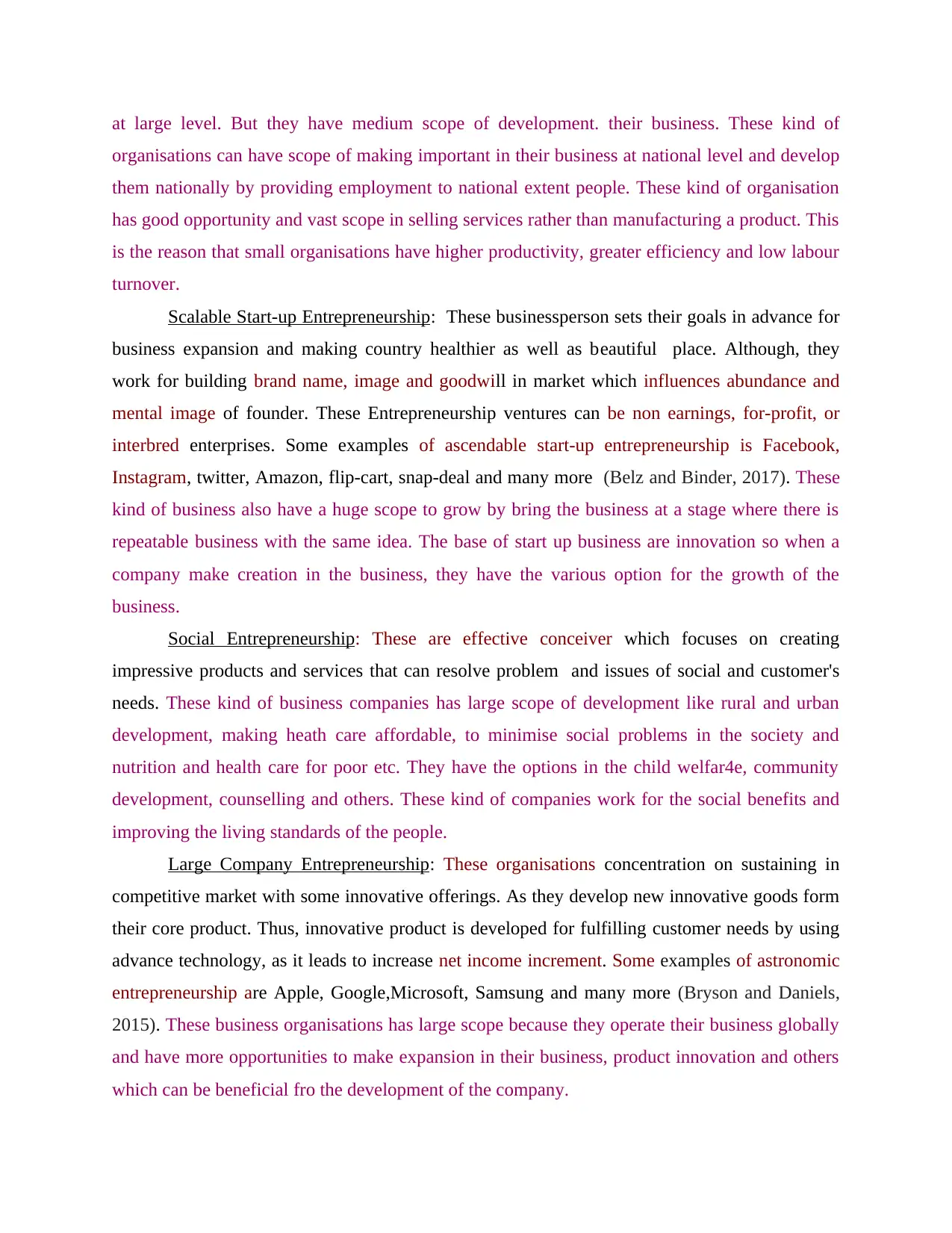
at large level. But they have medium scope of development. their business. These kind of
organisations can have scope of making important in their business at national level and develop
them nationally by providing employment to national extent people. These kind of organisation
has good opportunity and vast scope in selling services rather than manufacturing a product. This
is the reason that small organisations have higher productivity, greater efficiency and low labour
turnover.
Scalable Start-up Entrepreneurship: These businessperson sets their goals in advance for
business expansion and making country healthier as well as beautiful place. Although, they
work for building brand name, image and goodwill in market which influences abundance and
mental image of founder. These Entrepreneurship ventures can be non earnings, for-profit, or
interbred enterprises. Some examples of ascendable start-up entrepreneurship is Facebook,
Instagram, twitter, Amazon, flip-cart, snap-deal and many more (Belz and Binder, 2017). These
kind of business also have a huge scope to grow by bring the business at a stage where there is
repeatable business with the same idea. The base of start up business are innovation so when a
company make creation in the business, they have the various option for the growth of the
business.
Social Entrepreneurship: These are effective conceiver which focuses on creating
impressive products and services that can resolve problem and issues of social and customer's
needs. These kind of business companies has large scope of development like rural and urban
development, making heath care affordable, to minimise social problems in the society and
nutrition and health care for poor etc. They have the options in the child welfar4e, community
development, counselling and others. These kind of companies work for the social benefits and
improving the living standards of the people.
Large Company Entrepreneurship: These organisations concentration on sustaining in
competitive market with some innovative offerings. As they develop new innovative goods form
their core product. Thus, innovative product is developed for fulfilling customer needs by using
advance technology, as it leads to increase net income increment. Some examples of astronomic
entrepreneurship are Apple, Google,Microsoft, Samsung and many more (Bryson and Daniels,
2015). These business organisations has large scope because they operate their business globally
and have more opportunities to make expansion in their business, product innovation and others
which can be beneficial fro the development of the company.
organisations can have scope of making important in their business at national level and develop
them nationally by providing employment to national extent people. These kind of organisation
has good opportunity and vast scope in selling services rather than manufacturing a product. This
is the reason that small organisations have higher productivity, greater efficiency and low labour
turnover.
Scalable Start-up Entrepreneurship: These businessperson sets their goals in advance for
business expansion and making country healthier as well as beautiful place. Although, they
work for building brand name, image and goodwill in market which influences abundance and
mental image of founder. These Entrepreneurship ventures can be non earnings, for-profit, or
interbred enterprises. Some examples of ascendable start-up entrepreneurship is Facebook,
Instagram, twitter, Amazon, flip-cart, snap-deal and many more (Belz and Binder, 2017). These
kind of business also have a huge scope to grow by bring the business at a stage where there is
repeatable business with the same idea. The base of start up business are innovation so when a
company make creation in the business, they have the various option for the growth of the
business.
Social Entrepreneurship: These are effective conceiver which focuses on creating
impressive products and services that can resolve problem and issues of social and customer's
needs. These kind of business companies has large scope of development like rural and urban
development, making heath care affordable, to minimise social problems in the society and
nutrition and health care for poor etc. They have the options in the child welfar4e, community
development, counselling and others. These kind of companies work for the social benefits and
improving the living standards of the people.
Large Company Entrepreneurship: These organisations concentration on sustaining in
competitive market with some innovative offerings. As they develop new innovative goods form
their core product. Thus, innovative product is developed for fulfilling customer needs by using
advance technology, as it leads to increase net income increment. Some examples of astronomic
entrepreneurship are Apple, Google,Microsoft, Samsung and many more (Bryson and Daniels,
2015). These business organisations has large scope because they operate their business globally
and have more opportunities to make expansion in their business, product innovation and others
which can be beneficial fro the development of the company.
Paraphrase This Document
Need a fresh take? Get an instant paraphrase of this document with our AI Paraphraser
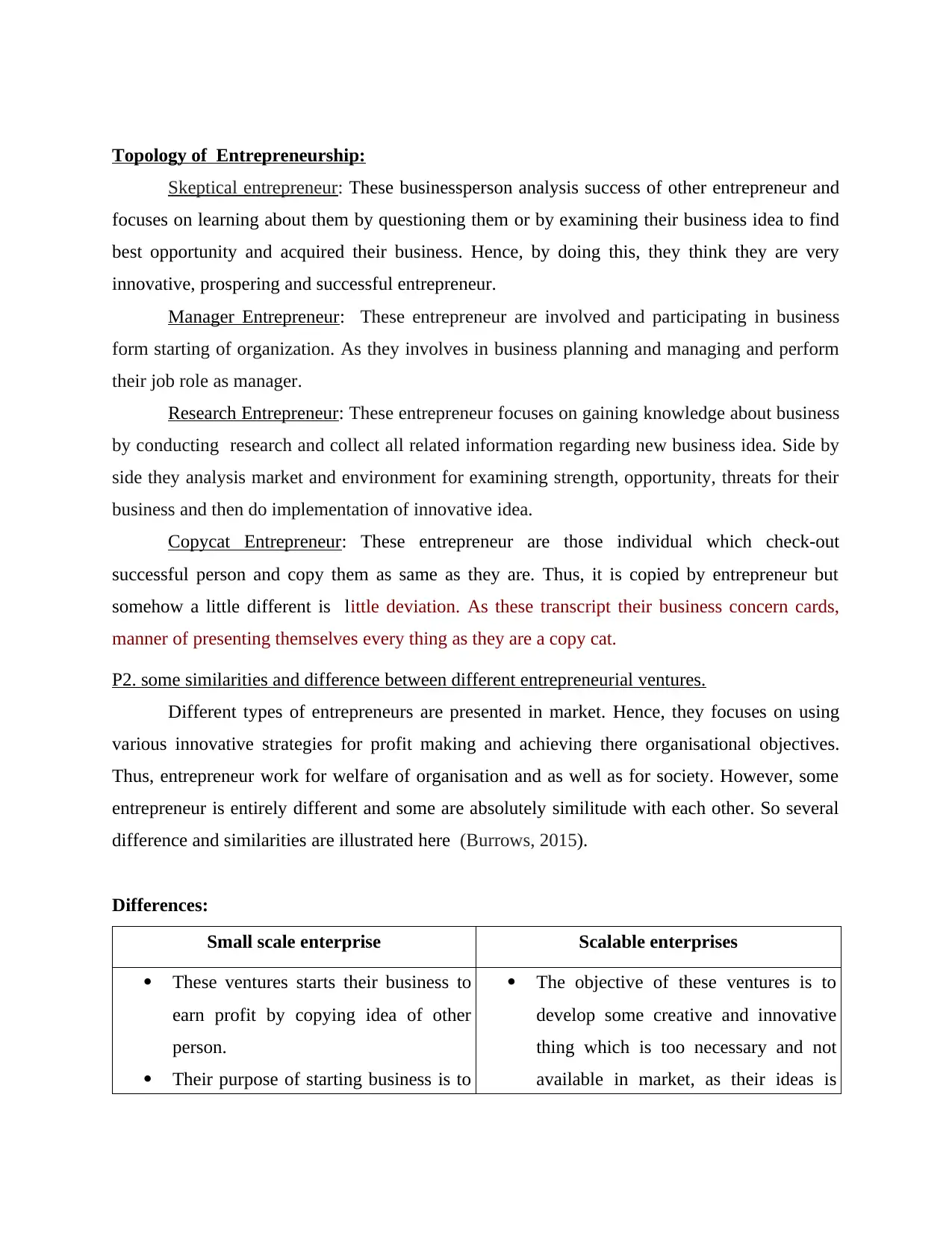
Topology of Entrepreneurship:
Skeptical entrepreneur: These businessperson analysis success of other entrepreneur and
focuses on learning about them by questioning them or by examining their business idea to find
best opportunity and acquired their business. Hence, by doing this, they think they are very
innovative, prospering and successful entrepreneur.
Manager Entrepreneur: These entrepreneur are involved and participating in business
form starting of organization. As they involves in business planning and managing and perform
their job role as manager.
Research Entrepreneur: These entrepreneur focuses on gaining knowledge about business
by conducting research and collect all related information regarding new business idea. Side by
side they analysis market and environment for examining strength, opportunity, threats for their
business and then do implementation of innovative idea.
Copycat Entrepreneur: These entrepreneur are those individual which check-out
successful person and copy them as same as they are. Thus, it is copied by entrepreneur but
somehow a little different is little deviation. As these transcript their business concern cards,
manner of presenting themselves every thing as they are a copy cat.
P2. some similarities and difference between different entrepreneurial ventures.
Different types of entrepreneurs are presented in market. Hence, they focuses on using
various innovative strategies for profit making and achieving there organisational objectives.
Thus, entrepreneur work for welfare of organisation and as well as for society. However, some
entrepreneur is entirely different and some are absolutely similitude with each other. So several
difference and similarities are illustrated here (Burrows, 2015).
Differences:
Small scale enterprise Scalable enterprises
These ventures starts their business to
earn profit by copying idea of other
person.
Their purpose of starting business is to
The objective of these ventures is to
develop some creative and innovative
thing which is too necessary and not
available in market, as their ideas is
Skeptical entrepreneur: These businessperson analysis success of other entrepreneur and
focuses on learning about them by questioning them or by examining their business idea to find
best opportunity and acquired their business. Hence, by doing this, they think they are very
innovative, prospering and successful entrepreneur.
Manager Entrepreneur: These entrepreneur are involved and participating in business
form starting of organization. As they involves in business planning and managing and perform
their job role as manager.
Research Entrepreneur: These entrepreneur focuses on gaining knowledge about business
by conducting research and collect all related information regarding new business idea. Side by
side they analysis market and environment for examining strength, opportunity, threats for their
business and then do implementation of innovative idea.
Copycat Entrepreneur: These entrepreneur are those individual which check-out
successful person and copy them as same as they are. Thus, it is copied by entrepreneur but
somehow a little different is little deviation. As these transcript their business concern cards,
manner of presenting themselves every thing as they are a copy cat.
P2. some similarities and difference between different entrepreneurial ventures.
Different types of entrepreneurs are presented in market. Hence, they focuses on using
various innovative strategies for profit making and achieving there organisational objectives.
Thus, entrepreneur work for welfare of organisation and as well as for society. However, some
entrepreneur is entirely different and some are absolutely similitude with each other. So several
difference and similarities are illustrated here (Burrows, 2015).
Differences:
Small scale enterprise Scalable enterprises
These ventures starts their business to
earn profit by copying idea of other
person.
Their purpose of starting business is to
The objective of these ventures is to
develop some creative and innovative
thing which is too necessary and not
available in market, as their ideas is
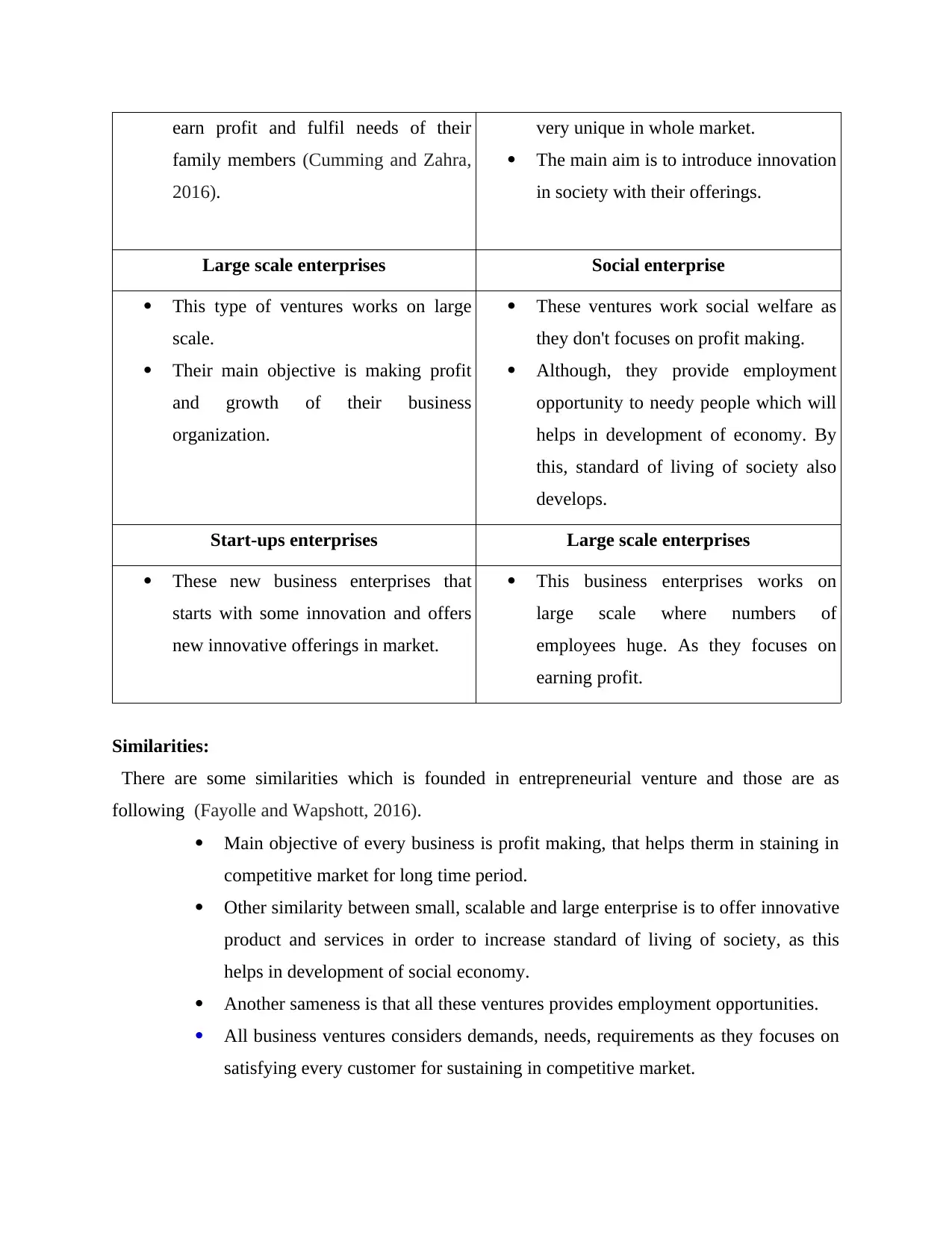
earn profit and fulfil needs of their
family members (Cumming and Zahra,
2016).
very unique in whole market.
The main aim is to introduce innovation
in society with their offerings.
Large scale enterprises Social enterprise
This type of ventures works on large
scale.
Their main objective is making profit
and growth of their business
organization.
These ventures work social welfare as
they don't focuses on profit making.
Although, they provide employment
opportunity to needy people which will
helps in development of economy. By
this, standard of living of society also
develops.
Start-ups enterprises Large scale enterprises
These new business enterprises that
starts with some innovation and offers
new innovative offerings in market.
This business enterprises works on
large scale where numbers of
employees huge. As they focuses on
earning profit.
Similarities:
There are some similarities which is founded in entrepreneurial venture and those are as
following (Fayolle and Wapshott, 2016).
Main objective of every business is profit making, that helps therm in staining in
competitive market for long time period.
Other similarity between small, scalable and large enterprise is to offer innovative
product and services in order to increase standard of living of society, as this
helps in development of social economy.
Another sameness is that all these ventures provides employment opportunities.
All business ventures considers demands, needs, requirements as they focuses on
satisfying every customer for sustaining in competitive market.
family members (Cumming and Zahra,
2016).
very unique in whole market.
The main aim is to introduce innovation
in society with their offerings.
Large scale enterprises Social enterprise
This type of ventures works on large
scale.
Their main objective is making profit
and growth of their business
organization.
These ventures work social welfare as
they don't focuses on profit making.
Although, they provide employment
opportunity to needy people which will
helps in development of economy. By
this, standard of living of society also
develops.
Start-ups enterprises Large scale enterprises
These new business enterprises that
starts with some innovation and offers
new innovative offerings in market.
This business enterprises works on
large scale where numbers of
employees huge. As they focuses on
earning profit.
Similarities:
There are some similarities which is founded in entrepreneurial venture and those are as
following (Fayolle and Wapshott, 2016).
Main objective of every business is profit making, that helps therm in staining in
competitive market for long time period.
Other similarity between small, scalable and large enterprise is to offer innovative
product and services in order to increase standard of living of society, as this
helps in development of social economy.
Another sameness is that all these ventures provides employment opportunities.
All business ventures considers demands, needs, requirements as they focuses on
satisfying every customer for sustaining in competitive market.
⊘ This is a preview!⊘
Do you want full access?
Subscribe today to unlock all pages.

Trusted by 1+ million students worldwide
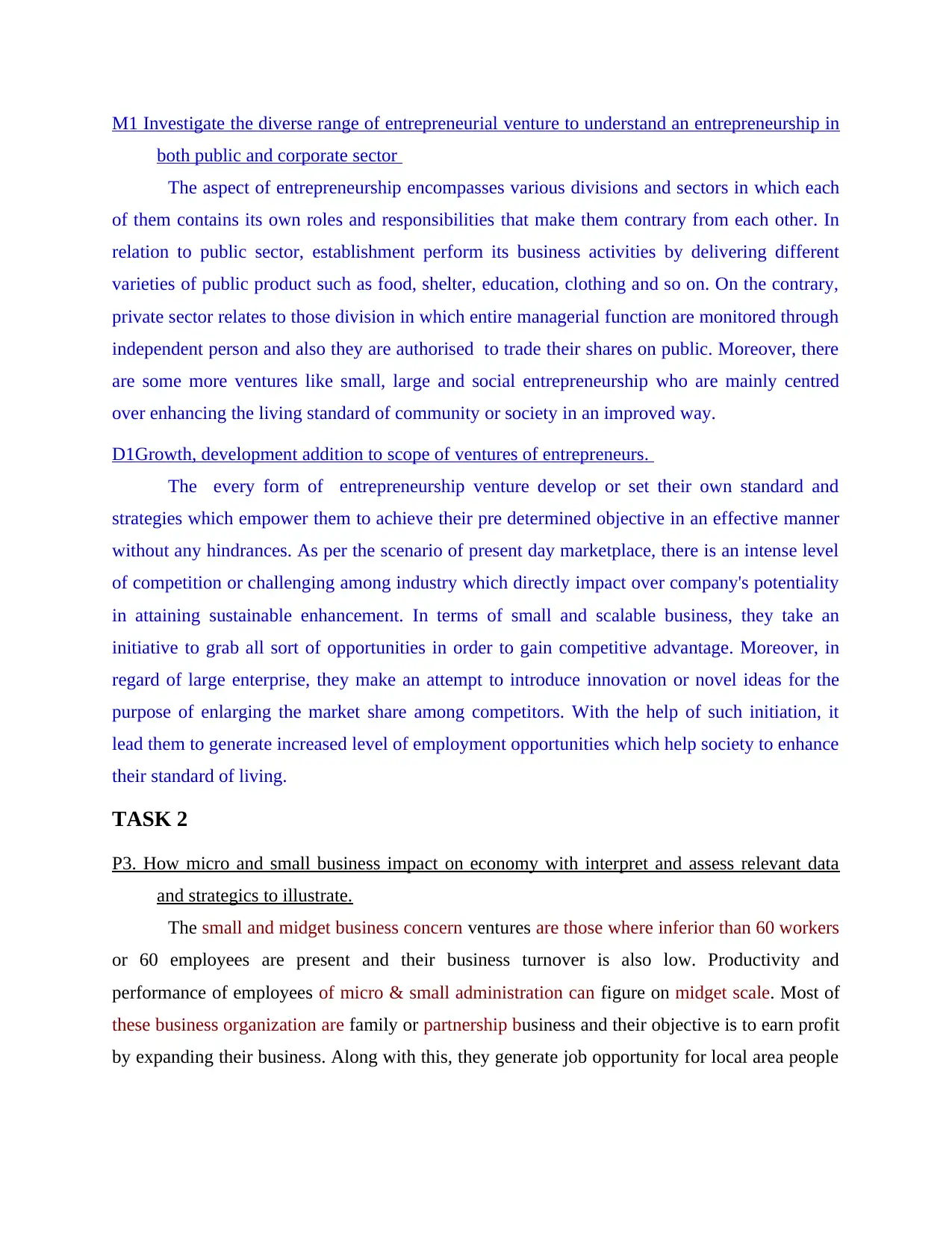
M1 Investigate the diverse range of entrepreneurial venture to understand an entrepreneurship in
both public and corporate sector
The aspect of entrepreneurship encompasses various divisions and sectors in which each
of them contains its own roles and responsibilities that make them contrary from each other. In
relation to public sector, establishment perform its business activities by delivering different
varieties of public product such as food, shelter, education, clothing and so on. On the contrary,
private sector relates to those division in which entire managerial function are monitored through
independent person and also they are authorised to trade their shares on public. Moreover, there
are some more ventures like small, large and social entrepreneurship who are mainly centred
over enhancing the living standard of community or society in an improved way.
D1Growth, development addition to scope of ventures of entrepreneurs.
The every form of entrepreneurship venture develop or set their own standard and
strategies which empower them to achieve their pre determined objective in an effective manner
without any hindrances. As per the scenario of present day marketplace, there is an intense level
of competition or challenging among industry which directly impact over company's potentiality
in attaining sustainable enhancement. In terms of small and scalable business, they take an
initiative to grab all sort of opportunities in order to gain competitive advantage. Moreover, in
regard of large enterprise, they make an attempt to introduce innovation or novel ideas for the
purpose of enlarging the market share among competitors. With the help of such initiation, it
lead them to generate increased level of employment opportunities which help society to enhance
their standard of living.
TASK 2
P3. How micro and small business impact on economy with interpret and assess relevant data
and strategics to illustrate.
The small and midget business concern ventures are those where inferior than 60 workers
or 60 employees are present and their business turnover is also low. Productivity and
performance of employees of micro & small administration can figure on midget scale. Most of
these business organization are family or partnership business and their objective is to earn profit
by expanding their business. Along with this, they generate job opportunity for local area people
both public and corporate sector
The aspect of entrepreneurship encompasses various divisions and sectors in which each
of them contains its own roles and responsibilities that make them contrary from each other. In
relation to public sector, establishment perform its business activities by delivering different
varieties of public product such as food, shelter, education, clothing and so on. On the contrary,
private sector relates to those division in which entire managerial function are monitored through
independent person and also they are authorised to trade their shares on public. Moreover, there
are some more ventures like small, large and social entrepreneurship who are mainly centred
over enhancing the living standard of community or society in an improved way.
D1Growth, development addition to scope of ventures of entrepreneurs.
The every form of entrepreneurship venture develop or set their own standard and
strategies which empower them to achieve their pre determined objective in an effective manner
without any hindrances. As per the scenario of present day marketplace, there is an intense level
of competition or challenging among industry which directly impact over company's potentiality
in attaining sustainable enhancement. In terms of small and scalable business, they take an
initiative to grab all sort of opportunities in order to gain competitive advantage. Moreover, in
regard of large enterprise, they make an attempt to introduce innovation or novel ideas for the
purpose of enlarging the market share among competitors. With the help of such initiation, it
lead them to generate increased level of employment opportunities which help society to enhance
their standard of living.
TASK 2
P3. How micro and small business impact on economy with interpret and assess relevant data
and strategics to illustrate.
The small and midget business concern ventures are those where inferior than 60 workers
or 60 employees are present and their business turnover is also low. Productivity and
performance of employees of micro & small administration can figure on midget scale. Most of
these business organization are family or partnership business and their objective is to earn profit
by expanding their business. Along with this, they generate job opportunity for local area people
Paraphrase This Document
Need a fresh take? Get an instant paraphrase of this document with our AI Paraphraser
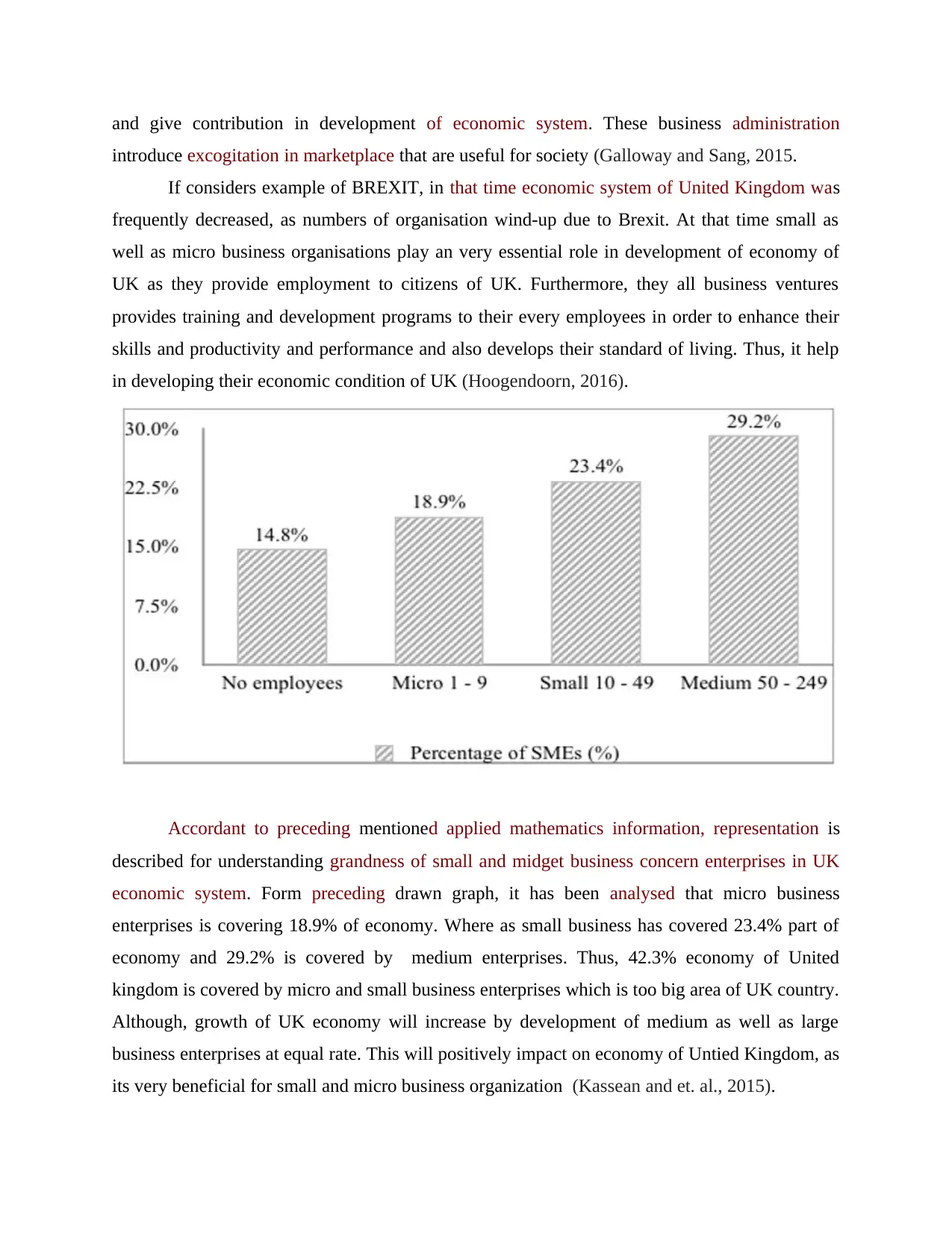
and give contribution in development of economic system. These business administration
introduce excogitation in marketplace that are useful for society (Galloway and Sang, 2015.
If considers example of BREXIT, in that time economic system of United Kingdom was
frequently decreased, as numbers of organisation wind-up due to Brexit. At that time small as
well as micro business organisations play an very essential role in development of economy of
UK as they provide employment to citizens of UK. Furthermore, they all business ventures
provides training and development programs to their every employees in order to enhance their
skills and productivity and performance and also develops their standard of living. Thus, it help
in developing their economic condition of UK (Hoogendoorn, 2016).
Accordant to preceding mentioned applied mathematics information, representation is
described for understanding grandness of small and midget business concern enterprises in UK
economic system. Form preceding drawn graph, it has been analysed that micro business
enterprises is covering 18.9% of economy. Where as small business has covered 23.4% part of
economy and 29.2% is covered by medium enterprises. Thus, 42.3% economy of United
kingdom is covered by micro and small business enterprises which is too big area of UK country.
Although, growth of UK economy will increase by development of medium as well as large
business enterprises at equal rate. This will positively impact on economy of Untied Kingdom, as
its very beneficial for small and micro business organization (Kassean and et. al., 2015).
introduce excogitation in marketplace that are useful for society (Galloway and Sang, 2015.
If considers example of BREXIT, in that time economic system of United Kingdom was
frequently decreased, as numbers of organisation wind-up due to Brexit. At that time small as
well as micro business organisations play an very essential role in development of economy of
UK as they provide employment to citizens of UK. Furthermore, they all business ventures
provides training and development programs to their every employees in order to enhance their
skills and productivity and performance and also develops their standard of living. Thus, it help
in developing their economic condition of UK (Hoogendoorn, 2016).
Accordant to preceding mentioned applied mathematics information, representation is
described for understanding grandness of small and midget business concern enterprises in UK
economic system. Form preceding drawn graph, it has been analysed that micro business
enterprises is covering 18.9% of economy. Where as small business has covered 23.4% part of
economy and 29.2% is covered by medium enterprises. Thus, 42.3% economy of United
kingdom is covered by micro and small business enterprises which is too big area of UK country.
Although, growth of UK economy will increase by development of medium as well as large
business enterprises at equal rate. This will positively impact on economy of Untied Kingdom, as
its very beneficial for small and micro business organization (Kassean and et. al., 2015).
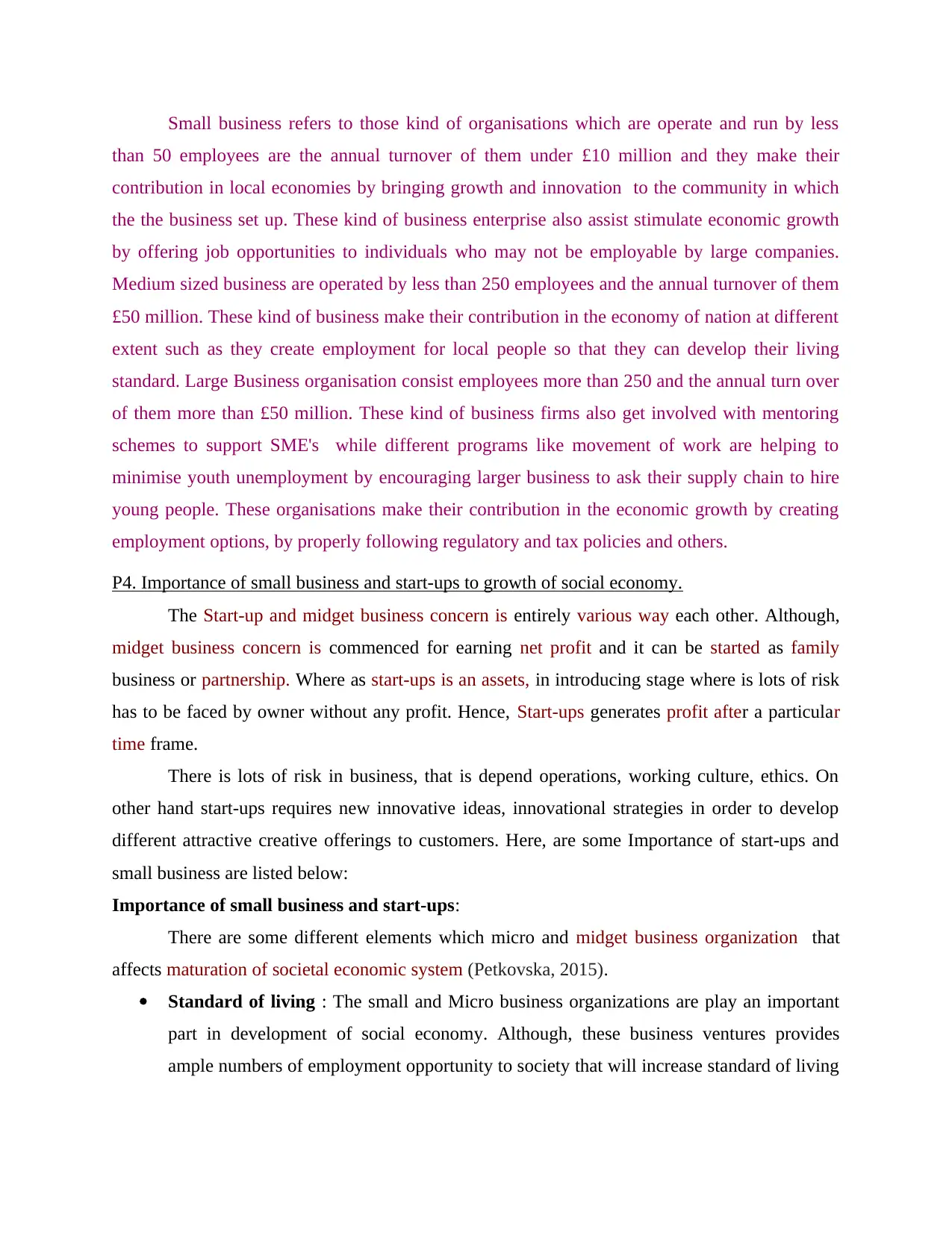
Small business refers to those kind of organisations which are operate and run by less
than 50 employees are the annual turnover of them under £10 million and they make their
contribution in local economies by bringing growth and innovation to the community in which
the the business set up. These kind of business enterprise also assist stimulate economic growth
by offering job opportunities to individuals who may not be employable by large companies.
Medium sized business are operated by less than 250 employees and the annual turnover of them
£50 million. These kind of business make their contribution in the economy of nation at different
extent such as they create employment for local people so that they can develop their living
standard. Large Business organisation consist employees more than 250 and the annual turn over
of them more than £50 million. These kind of business firms also get involved with mentoring
schemes to support SME's while different programs like movement of work are helping to
minimise youth unemployment by encouraging larger business to ask their supply chain to hire
young people. These organisations make their contribution in the economic growth by creating
employment options, by properly following regulatory and tax policies and others.
P4. Importance of small business and start-ups to growth of social economy.
The Start-up and midget business concern is entirely various way each other. Although,
midget business concern is commenced for earning net profit and it can be started as family
business or partnership. Where as start-ups is an assets, in introducing stage where is lots of risk
has to be faced by owner without any profit. Hence, Start-ups generates profit after a particular
time frame.
There is lots of risk in business, that is depend operations, working culture, ethics. On
other hand start-ups requires new innovative ideas, innovational strategies in order to develop
different attractive creative offerings to customers. Here, are some Importance of start-ups and
small business are listed below:
Importance of small business and start-ups:
There are some different elements which micro and midget business organization that
affects maturation of societal economic system (Petkovska, 2015).
Standard of living : The small and Micro business organizations are play an important
part in development of social economy. Although, these business ventures provides
ample numbers of employment opportunity to society that will increase standard of living
than 50 employees are the annual turnover of them under £10 million and they make their
contribution in local economies by bringing growth and innovation to the community in which
the the business set up. These kind of business enterprise also assist stimulate economic growth
by offering job opportunities to individuals who may not be employable by large companies.
Medium sized business are operated by less than 250 employees and the annual turnover of them
£50 million. These kind of business make their contribution in the economy of nation at different
extent such as they create employment for local people so that they can develop their living
standard. Large Business organisation consist employees more than 250 and the annual turn over
of them more than £50 million. These kind of business firms also get involved with mentoring
schemes to support SME's while different programs like movement of work are helping to
minimise youth unemployment by encouraging larger business to ask their supply chain to hire
young people. These organisations make their contribution in the economic growth by creating
employment options, by properly following regulatory and tax policies and others.
P4. Importance of small business and start-ups to growth of social economy.
The Start-up and midget business concern is entirely various way each other. Although,
midget business concern is commenced for earning net profit and it can be started as family
business or partnership. Where as start-ups is an assets, in introducing stage where is lots of risk
has to be faced by owner without any profit. Hence, Start-ups generates profit after a particular
time frame.
There is lots of risk in business, that is depend operations, working culture, ethics. On
other hand start-ups requires new innovative ideas, innovational strategies in order to develop
different attractive creative offerings to customers. Here, are some Importance of start-ups and
small business are listed below:
Importance of small business and start-ups:
There are some different elements which micro and midget business organization that
affects maturation of societal economic system (Petkovska, 2015).
Standard of living : The small and Micro business organizations are play an important
part in development of social economy. Although, these business ventures provides
ample numbers of employment opportunity to society that will increase standard of living
⊘ This is a preview!⊘
Do you want full access?
Subscribe today to unlock all pages.

Trusted by 1+ million students worldwide
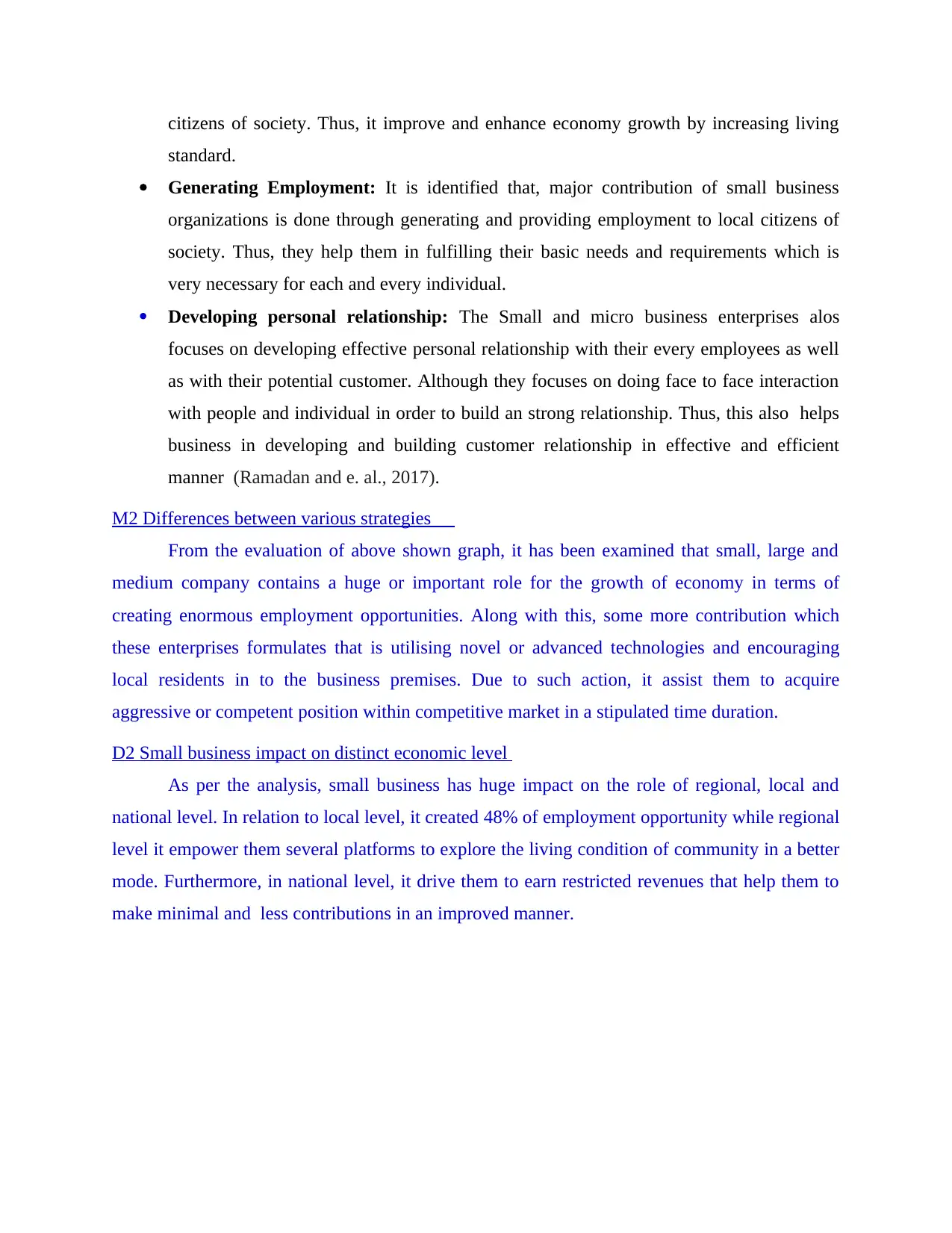
citizens of society. Thus, it improve and enhance economy growth by increasing living
standard.
Generating Employment: It is identified that, major contribution of small business
organizations is done through generating and providing employment to local citizens of
society. Thus, they help them in fulfilling their basic needs and requirements which is
very necessary for each and every individual.
Developing personal relationship: The Small and micro business enterprises alos
focuses on developing effective personal relationship with their every employees as well
as with their potential customer. Although they focuses on doing face to face interaction
with people and individual in order to build an strong relationship. Thus, this also helps
business in developing and building customer relationship in effective and efficient
manner (Ramadan and e. al., 2017).
M2 Differences between various strategies
From the evaluation of above shown graph, it has been examined that small, large and
medium company contains a huge or important role for the growth of economy in terms of
creating enormous employment opportunities. Along with this, some more contribution which
these enterprises formulates that is utilising novel or advanced technologies and encouraging
local residents in to the business premises. Due to such action, it assist them to acquire
aggressive or competent position within competitive market in a stipulated time duration.
D2 Small business impact on distinct economic level
As per the analysis, small business has huge impact on the role of regional, local and
national level. In relation to local level, it created 48% of employment opportunity while regional
level it empower them several platforms to explore the living condition of community in a better
mode. Furthermore, in national level, it drive them to earn restricted revenues that help them to
make minimal and less contributions in an improved manner.
standard.
Generating Employment: It is identified that, major contribution of small business
organizations is done through generating and providing employment to local citizens of
society. Thus, they help them in fulfilling their basic needs and requirements which is
very necessary for each and every individual.
Developing personal relationship: The Small and micro business enterprises alos
focuses on developing effective personal relationship with their every employees as well
as with their potential customer. Although they focuses on doing face to face interaction
with people and individual in order to build an strong relationship. Thus, this also helps
business in developing and building customer relationship in effective and efficient
manner (Ramadan and e. al., 2017).
M2 Differences between various strategies
From the evaluation of above shown graph, it has been examined that small, large and
medium company contains a huge or important role for the growth of economy in terms of
creating enormous employment opportunities. Along with this, some more contribution which
these enterprises formulates that is utilising novel or advanced technologies and encouraging
local residents in to the business premises. Due to such action, it assist them to acquire
aggressive or competent position within competitive market in a stipulated time duration.
D2 Small business impact on distinct economic level
As per the analysis, small business has huge impact on the role of regional, local and
national level. In relation to local level, it created 48% of employment opportunity while regional
level it empower them several platforms to explore the living condition of community in a better
mode. Furthermore, in national level, it drive them to earn restricted revenues that help them to
make minimal and less contributions in an improved manner.
Paraphrase This Document
Need a fresh take? Get an instant paraphrase of this document with our AI Paraphraser
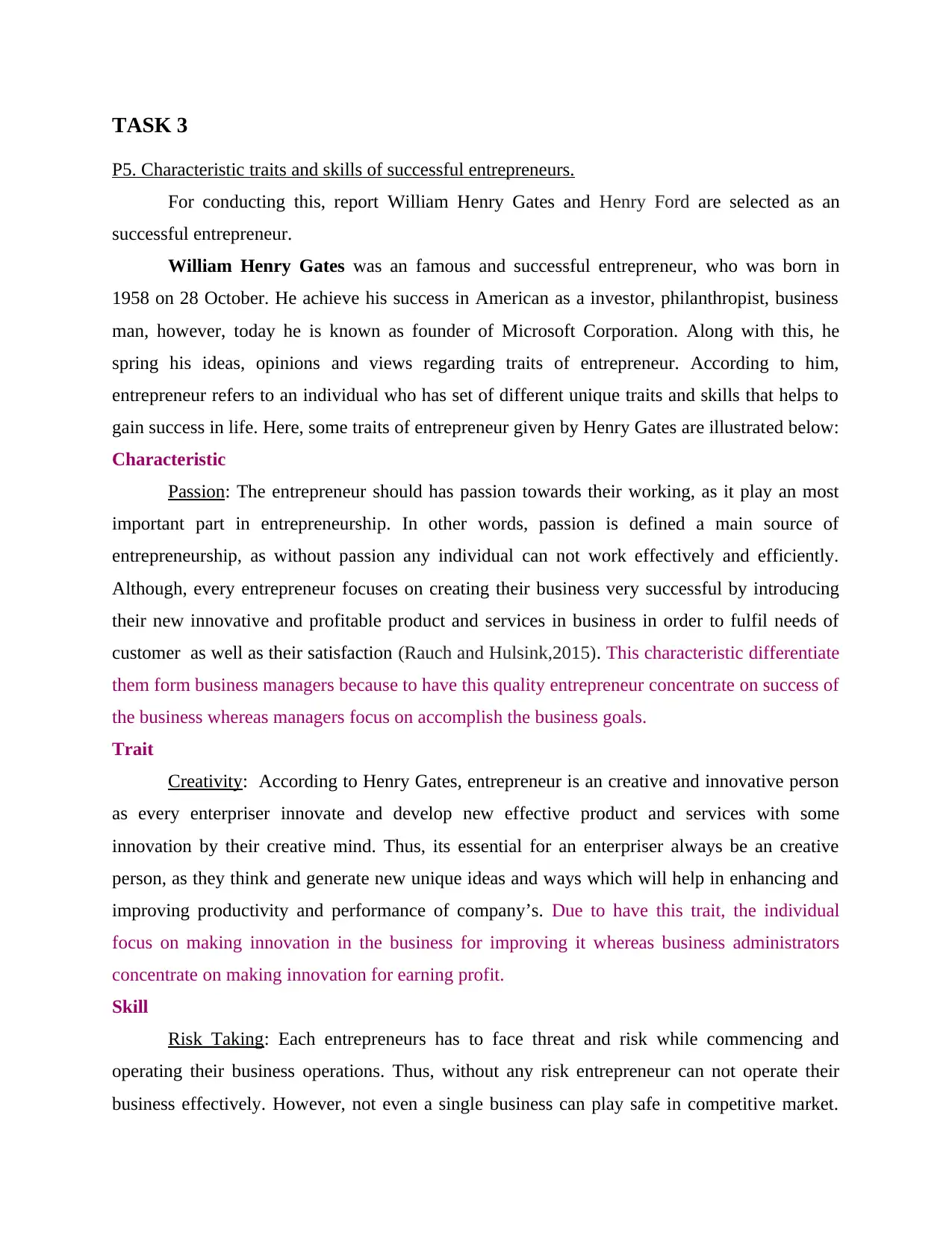
TASK 3
P5. Characteristic traits and skills of successful entrepreneurs.
For conducting this, report William Henry Gates and Henry Ford are selected as an
successful entrepreneur.
William Henry Gates was an famous and successful entrepreneur, who was born in
1958 on 28 October. He achieve his success in American as a investor, philanthropist, business
man, however, today he is known as founder of Microsoft Corporation. Along with this, he
spring his ideas, opinions and views regarding traits of entrepreneur. According to him,
entrepreneur refers to an individual who has set of different unique traits and skills that helps to
gain success in life. Here, some traits of entrepreneur given by Henry Gates are illustrated below:
Characteristic
Passion: The entrepreneur should has passion towards their working, as it play an most
important part in entrepreneurship. In other words, passion is defined a main source of
entrepreneurship, as without passion any individual can not work effectively and efficiently.
Although, every entrepreneur focuses on creating their business very successful by introducing
their new innovative and profitable product and services in business in order to fulfil needs of
customer as well as their satisfaction (Rauch and Hulsink,2015). This characteristic differentiate
them form business managers because to have this quality entrepreneur concentrate on success of
the business whereas managers focus on accomplish the business goals.
Trait
Creativity: According to Henry Gates, entrepreneur is an creative and innovative person
as every enterpriser innovate and develop new effective product and services with some
innovation by their creative mind. Thus, its essential for an enterpriser always be an creative
person, as they think and generate new unique ideas and ways which will help in enhancing and
improving productivity and performance of company’s. Due to have this trait, the individual
focus on making innovation in the business for improving it whereas business administrators
concentrate on making innovation for earning profit.
Skill
Risk Taking: Each entrepreneurs has to face threat and risk while commencing and
operating their business operations. Thus, without any risk entrepreneur can not operate their
business effectively. However, not even a single business can play safe in competitive market.
P5. Characteristic traits and skills of successful entrepreneurs.
For conducting this, report William Henry Gates and Henry Ford are selected as an
successful entrepreneur.
William Henry Gates was an famous and successful entrepreneur, who was born in
1958 on 28 October. He achieve his success in American as a investor, philanthropist, business
man, however, today he is known as founder of Microsoft Corporation. Along with this, he
spring his ideas, opinions and views regarding traits of entrepreneur. According to him,
entrepreneur refers to an individual who has set of different unique traits and skills that helps to
gain success in life. Here, some traits of entrepreneur given by Henry Gates are illustrated below:
Characteristic
Passion: The entrepreneur should has passion towards their working, as it play an most
important part in entrepreneurship. In other words, passion is defined a main source of
entrepreneurship, as without passion any individual can not work effectively and efficiently.
Although, every entrepreneur focuses on creating their business very successful by introducing
their new innovative and profitable product and services in business in order to fulfil needs of
customer as well as their satisfaction (Rauch and Hulsink,2015). This characteristic differentiate
them form business managers because to have this quality entrepreneur concentrate on success of
the business whereas managers focus on accomplish the business goals.
Trait
Creativity: According to Henry Gates, entrepreneur is an creative and innovative person
as every enterpriser innovate and develop new effective product and services with some
innovation by their creative mind. Thus, its essential for an enterpriser always be an creative
person, as they think and generate new unique ideas and ways which will help in enhancing and
improving productivity and performance of company’s. Due to have this trait, the individual
focus on making innovation in the business for improving it whereas business administrators
concentrate on making innovation for earning profit.
Skill
Risk Taking: Each entrepreneurs has to face threat and risk while commencing and
operating their business operations. Thus, without any risk entrepreneur can not operate their
business effectively. However, not even a single business can play safe in competitive market.
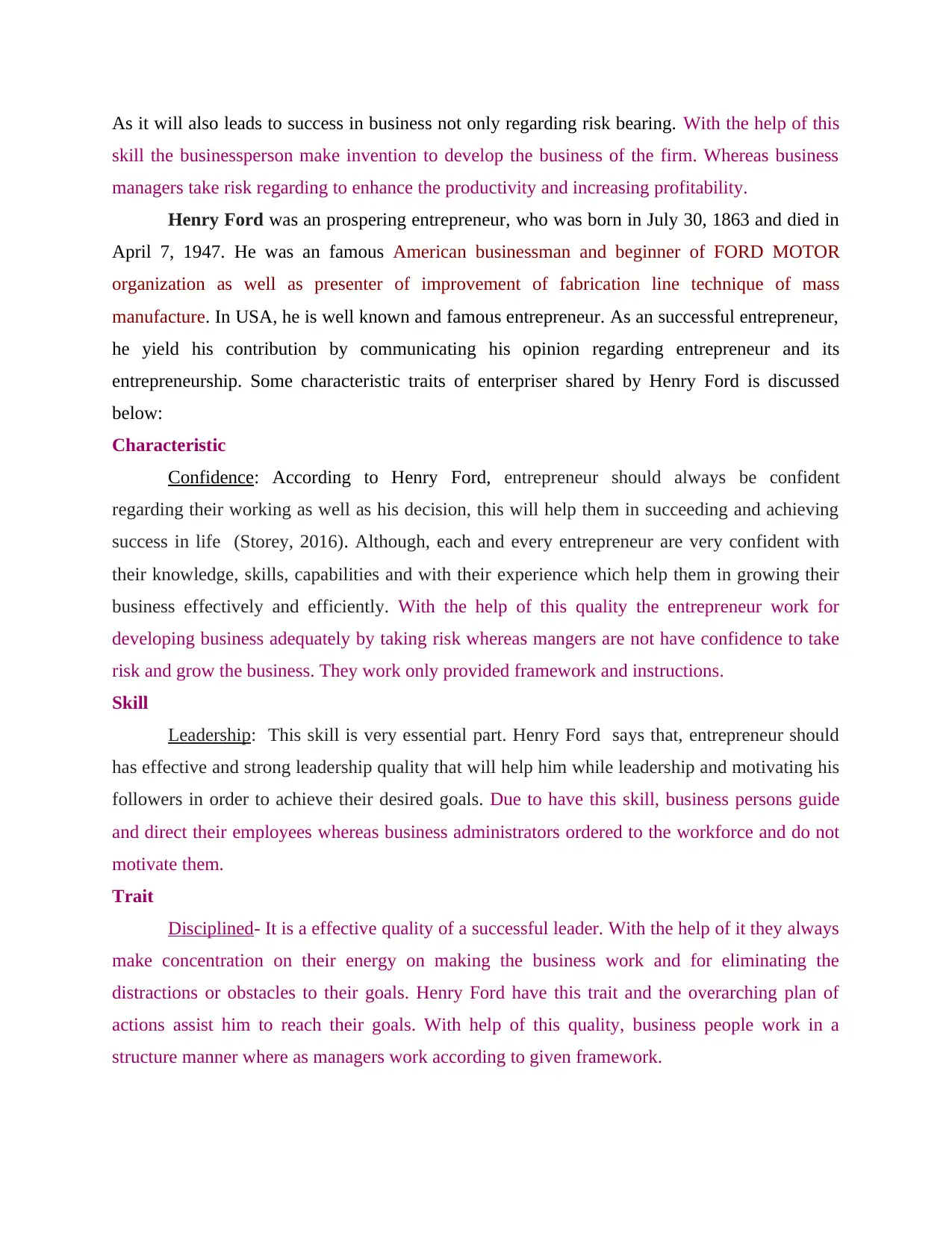
As it will also leads to success in business not only regarding risk bearing. With the help of this
skill the businessperson make invention to develop the business of the firm. Whereas business
managers take risk regarding to enhance the productivity and increasing profitability.
Henry Ford was an prospering entrepreneur, who was born in July 30, 1863 and died in
April 7, 1947. He was an famous American businessman and beginner of FORD MOTOR
organization as well as presenter of improvement of fabrication line technique of mass
manufacture. In USA, he is well known and famous entrepreneur. As an successful entrepreneur,
he yield his contribution by communicating his opinion regarding entrepreneur and its
entrepreneurship. Some characteristic traits of enterpriser shared by Henry Ford is discussed
below:
Characteristic
Confidence: According to Henry Ford, entrepreneur should always be confident
regarding their working as well as his decision, this will help them in succeeding and achieving
success in life (Storey, 2016). Although, each and every entrepreneur are very confident with
their knowledge, skills, capabilities and with their experience which help them in growing their
business effectively and efficiently. With the help of this quality the entrepreneur work for
developing business adequately by taking risk whereas mangers are not have confidence to take
risk and grow the business. They work only provided framework and instructions.
Skill
Leadership: This skill is very essential part. Henry Ford says that, entrepreneur should
has effective and strong leadership quality that will help him while leadership and motivating his
followers in order to achieve their desired goals. Due to have this skill, business persons guide
and direct their employees whereas business administrators ordered to the workforce and do not
motivate them.
Trait
Disciplined- It is a effective quality of a successful leader. With the help of it they always
make concentration on their energy on making the business work and for eliminating the
distractions or obstacles to their goals. Henry Ford have this trait and the overarching plan of
actions assist him to reach their goals. With help of this quality, business people work in a
structure manner where as managers work according to given framework.
skill the businessperson make invention to develop the business of the firm. Whereas business
managers take risk regarding to enhance the productivity and increasing profitability.
Henry Ford was an prospering entrepreneur, who was born in July 30, 1863 and died in
April 7, 1947. He was an famous American businessman and beginner of FORD MOTOR
organization as well as presenter of improvement of fabrication line technique of mass
manufacture. In USA, he is well known and famous entrepreneur. As an successful entrepreneur,
he yield his contribution by communicating his opinion regarding entrepreneur and its
entrepreneurship. Some characteristic traits of enterpriser shared by Henry Ford is discussed
below:
Characteristic
Confidence: According to Henry Ford, entrepreneur should always be confident
regarding their working as well as his decision, this will help them in succeeding and achieving
success in life (Storey, 2016). Although, each and every entrepreneur are very confident with
their knowledge, skills, capabilities and with their experience which help them in growing their
business effectively and efficiently. With the help of this quality the entrepreneur work for
developing business adequately by taking risk whereas mangers are not have confidence to take
risk and grow the business. They work only provided framework and instructions.
Skill
Leadership: This skill is very essential part. Henry Ford says that, entrepreneur should
has effective and strong leadership quality that will help him while leadership and motivating his
followers in order to achieve their desired goals. Due to have this skill, business persons guide
and direct their employees whereas business administrators ordered to the workforce and do not
motivate them.
Trait
Disciplined- It is a effective quality of a successful leader. With the help of it they always
make concentration on their energy on making the business work and for eliminating the
distractions or obstacles to their goals. Henry Ford have this trait and the overarching plan of
actions assist him to reach their goals. With help of this quality, business people work in a
structure manner where as managers work according to given framework.
⊘ This is a preview!⊘
Do you want full access?
Subscribe today to unlock all pages.

Trusted by 1+ million students worldwide
1 out of 17
Related Documents
Your All-in-One AI-Powered Toolkit for Academic Success.
+13062052269
info@desklib.com
Available 24*7 on WhatsApp / Email
![[object Object]](/_next/static/media/star-bottom.7253800d.svg)
Unlock your academic potential
Copyright © 2020–2026 A2Z Services. All Rights Reserved. Developed and managed by ZUCOL.





